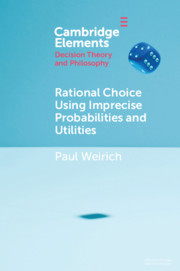Description
Rational Choice Using Imprecise Probabilities and Utilities
Elements in Decision Theory and Philosophy Series
Author: Weirich Paul
To make decision theory realistic, I show how to choose rationally when possible outcomes have imprecise probabilities and utilities.
Language: English
Subject for Rational Choice Using Imprecise Probabilities and Utilities:
Approximative price 22.46 €
In Print (Delivery period: 14 days).
Add to cart
Publication date: 02-2021
Support: Print on demand
Support: Print on demand
Description
/li>Contents
/li>
An agent often does not have precise probabilities or utilities to guide resolution of a decision problem. I advance a principle of rationality for making decisions in such cases. To begin, I represent the doxastic and conative state of an agent with a set of pairs of a probability assignment and a utility assignment. Then I support a decision principle that allows any act that maximizes expected utility according to some pair of assignments in the set. Assuming that computation of an option's expected utility uses comprehensive possible outcomes that include the option's risk, no consideration supports a stricter requirement.
1. Introduction; 2. Imprecision; 3. Rational imprecision; 4. Probabilism; 5. The expected-utility principle; 6. Norms for imprecise attitudes; 7. The permissive principle of choice; 8. Sequences of choices; 9. Choices in games of strategy; 10. Conclusion.
© 2024 LAVOISIER S.A.S.



